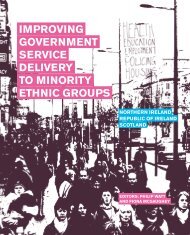4858 Mental Health Report - National University of Ireland, Galway
4858 Mental Health Report - National University of Ireland, Galway
4858 Mental Health Report - National University of Ireland, Galway
Create successful ePaper yourself
Turn your PDF publications into a flip-book with our unique Google optimized e-Paper software.
Findings from the Compatibility and<br />
Comparability <strong>of</strong> <strong>Mental</strong> <strong>Health</strong> and<br />
Related <strong>Health</strong> Data Sources<br />
How the students feel in general was assessed by asking: ‘In general, how do you<br />
feel about your life at present’ The majority <strong>of</strong> students reported feeling very<br />
happy or quite happy. 92.3% <strong>of</strong> students in England, 90% <strong>of</strong> students in Northern<br />
<strong>Ireland</strong> and 89.2% <strong>of</strong> students in the Republic <strong>of</strong> <strong>Ireland</strong> reported feeling happy.<br />
Students were also asked if they ever felt lonely. 12.3% <strong>of</strong> students in Northern<br />
<strong>Ireland</strong>, 11.8% <strong>of</strong> students in the Republic <strong>of</strong> <strong>Ireland</strong> and 10.6% <strong>of</strong> students in<br />
England reported that they felt lonely rather <strong>of</strong>ten or very <strong>of</strong>ten.<br />
Students were also asked if they had used medication for nervousness in the<br />
previous month. 5.3% <strong>of</strong> students in Northern <strong>Ireland</strong>, 4.5% <strong>of</strong> students in the<br />
Republic <strong>of</strong> <strong>Ireland</strong> and 3.6% <strong>of</strong> students in England reported that they had used<br />
medication in the month prior to the survey for nervousness.<br />
The usefulness <strong>of</strong> the HBSC study is that it allows for direct comparisons across<br />
countries. Valid cross-country comparisons are particularly important in<br />
emphasising commonalities across countries, as well as differences between them<br />
(WHO 2001).<br />
Consultation on Data Harmonisation<br />
The findings from the study day in Armagh with regard to data harmonisation<br />
are presented first. The study day was attended by 45 people, representing a<br />
wide range <strong>of</strong> interests including policy makers, health agencies, research bodies,<br />
voluntary organisations and statutory bodies.<br />
Armagh Study Day Discussion Groups<br />
At the study day in Armagh, a question was asked with regard to data<br />
harmonisation on an all-island basis. The findings from the discussion are now<br />
presented:<br />
Discussion groups were asked: ‘How do we further the harmonisation <strong>of</strong> mental<br />
health data collection on the island <strong>of</strong> <strong>Ireland</strong>’<br />
There was a general view that the harmonisation <strong>of</strong> data sources was desirable.<br />
Key issues highlighted included the following:<br />
In order to achieve harmonisation, it was felt that cross-border collaboration<br />
needs to become part <strong>of</strong> the core business <strong>of</strong> health organisations. Furthermore<br />
we need to look at where health promotion fits into overall health policy. We<br />
also need to agree on what constitutes evidence. Another group suggested we<br />
might have more discussion with pr<strong>of</strong>essionals and research bodies to agree<br />
standards and the selection <strong>of</strong> specific measures for national surveys.<br />
111
















